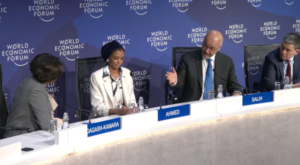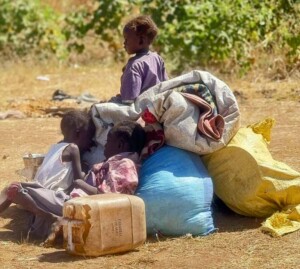Sudan Leaks: ‘UN Security Council was misinformed about Janjaweed’
The Sudanese government told the United Nations (UN) that it had disarmed the Janjaweed, while in reality the militiamen were integrated into new paramilitary groups. The UN then failed to inform the Security Council (UNSC) about these facts. Aicha El Basri, the former spokeswoman of the UN African Union Mission in Darfur (Unamid) spoke to Radio Dabanga this week in an extensive interview, of which the first part was published yesterday.“They could continue their crimes in Darfur under new names such as Central Reserve Police (locally known as Abu Tira), Border Guards, and the Popular Defence Forces since 2005, to say the least. This constitutes a flagrant violation of Security Council resolution 1556 of 2004 concerning the disarmament of the government-backed Janjaweed in Darfur, and the prosecution of their leaders. “A group of UN experts told the UNSC in early 2006 that the Sudanese government had informed them about the integration of the Janjaweed militias into auxiliary forces, and that no Janjaweed existed anymore in Darfur,” El Basri said. “This means that officially the Sudanese government is responsible for the human rights violations and the crimes against humanity.” Misinformation “The UN, however, did not tell the world that the Sudanese government failed to disarm the Janjaweed militias; that it, conversely, reintegrated them into paramilitary forces under new names, and let them continue committing their widespread, systematic attacks directed against the civilian population in Darfur. “Because of this misinformation, the term Janjaweed disappeared from UN reports, including those by UN Secretary-General Ban Ki-moon to the UNSC. In order to satisfy the Sudanese government, the word Janjaweed did not appear in more than 30 reports by the Secretary-General except once, and that was in 2008.” The former Unamid spokeswoman explained that the Unamid and UN failures to report the truth, and their omission of important details, have led to “the recent confusion and misunderstanding about what is happening in Darfur and about who are committing crimes in the region. “The UN silence about Darfur, and the failure of calling things by their name are the reason that the world did not and does not have a clue about the real situation in Darfur. It is not known that the Sudanese government has violated UNSC resolutions by not disarming the militias, not keeping them away from civilians, and refusing to bring all Janjaweed leaders to justice.” No diagnosis “This failure and the silence about Darfur have prolonged the conflict in the war-torn region and the suffering of the Darfuris. How can you provide assistance, or approve of effective solutions, if you have not diagnosed the disease? The silence, and the failure of naming a spade a spade, is like treating a disease without a diagnosis. The ongoing developments and destruction on the ground today in Darfur have not been diagnosed,” El Basri concludes. File photo: Aicha El Basri, after she joined Unamid in 2012 Related:Sudan Leaks: Unamid spokesperson ‘resigned to tell the truth about Darfur’ (9 April 2014)’UN missions fail to grasp Darfur, Sudan conflict’: human rights activist (9 April 2014)Sudan Leaks: UN admits Darfur reports slanted to please Sudan (8 April 2014) Sudan Leaks: ‘UN withheld key information on ethnic cleansing in Darfur’ (7 April 2014)Unamid call for observers Special Court for Darfur ‘waste of time’: Darfur Bar (26 January 2014)
The Sudanese government told the United Nations (UN) that it had disarmed the Janjaweed, while in reality the militiamen were integrated into new paramilitary groups. The UN then failed to inform the Security Council (UNSC) about these facts.
Aicha El Basri, the former spokeswoman of the UN African Union Mission in Darfur (Unamid) spoke to Radio Dabanga this week in an extensive interview, of which the first part was published yesterday.
“They could continue their crimes in Darfur under new names such as Central Reserve Police (locally known as Abu Tira), Border Guards, and the Popular Defence Forces since 2005, to say the least. This constitutes a flagrant violation of Security Council resolution 1556 of 2004 concerning the disarmament of the government-backed Janjaweed in Darfur, and the prosecution of their leaders.
“A group of UN experts told the UNSC in early 2006 that the Sudanese government had informed them about the integration of the Janjaweed militias into auxiliary forces, and that no Janjaweed existed anymore in Darfur,” El Basri said.
“This means that officially the Sudanese government is responsible for the human rights violations and the crimes against humanity.”
Misinformation
“The UN, however, did not tell the world that the Sudanese government failed to disarm the Janjaweed militias; that it, conversely, reintegrated them into paramilitary forces under new names, and let them continue committing their widespread, systematic attacks directed against the civilian population in Darfur.
“Because of this misinformation, the term Janjaweed disappeared from UN reports, including those by UN Secretary-General Ban Ki-moon to the UNSC. In order to satisfy the Sudanese government, the word Janjaweed did not appear in more than 30 reports by the Secretary-General except once, and that was in 2008.”
The former Unamid spokeswoman explained that the Unamid and UN failures to report the truth, and their omission of important details, have led to “the recent confusion and misunderstanding about what is happening in Darfur and about who are committing crimes in the region.
“The UN silence about Darfur, and the failure of calling things by their name are the reason that the world did not and does not have a clue about the real situation in Darfur. It is not known that the Sudanese government has violated UNSC resolutions by not disarming the militias, not keeping them away from civilians, and refusing to bring all Janjaweed leaders to justice.”
No diagnosis
“This failure and the silence about Darfur have prolonged the conflict in the war-torn region and the suffering of the Darfuris. How can you provide assistance, or approve of effective solutions, if you have not diagnosed the disease? The silence, and the failure of naming a spade a spade, is like treating a disease without a diagnosis. The ongoing developments and destruction on the ground today in Darfur have not been diagnosed,” El Basri concludes.
File photo: Aicha El Basri, after she joined Unamid in 2012
Related:
Sudan Leaks: Unamid spokesperson 'resigned to tell the truth about Darfur' (9 April 2014)
'UN missions fail to grasp Darfur, Sudan conflict': human rights activist (9 April 2014)
Sudan Leaks: UN admits Darfur reports slanted to please Sudan (8 April 2014)
Sudan Leaks: ‘UN withheld key information on ethnic cleansing in Darfur’ (7 April 2014)
Unamid call for observers Special Court for Darfur ‘waste of time’: Darfur Bar (26 January 2014)











 and then
and then